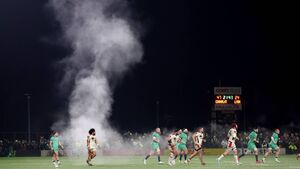Europe’s jewel has lost some of its sparkle

Olympique Universitaire Lyon’s Lyan Pakihivatau lets off some steam during lst Saturday's match against Connacht in Round 3 of the European Rugby Challenge Cup at Dexcom Stadium, Galway. Picture: INPHO/James Crombie
They say don’t try to fix something that’s not broken.
You can counter that argument with the cliché that if you’re standing still you’re moving backwards, so it’s hard to know what the best way to go about things is. It all depends, really, on the outcome after changes are implemented.
In that context, one has to wonder what those in charge of European club rugby, the EPCR, are thinking about the current incarnation of the jewel in the crown of club rugby in this part of the world: the Champions Cup.
Given the competition is now in its 30th year, it's an opportune time to assess where it stands in an increasingly packed sporting environment where the competition for eyeballs is as intense as it ever was.
Put simply, the Champions Cup is not in a great place.
Don’t take this from me; here are a few quotes from much more qualified people to assess the competition's current health.
Nigel Owens, the well-known Welsh referee, wrote on social media in December that ‘when it was the Heineken Cup, it was the tournament everyone wanted to play and referee in, as well as go to watch. Sadly it has lost its magic in the last few years. Very sad, as it was special.” The Irish Times rugby correspondent, Gerry Thornley, wrote last month that the set of results from the opening two rounds showed ‘the waning appeal of the Champions Cup’.
Writing in The Telegraph this time last year, Ben Coles, the paper’s rugby reporter, made a key, and important, distinction.
“This modern version of the Champions Cup is a strange competition. Not that strange should be confused with bad, because the action on the field over the last two weeks has been engrossing.
He continued: “The players are doing their part to make the product sing, but how many people are really listening?
“Multiple factors currently stand in the Champions Cup’s way of being taken more seriously, not just within rugby but outside of it as well.” The number of dissenting voices within the game now speaking around the same topic means there is clearly a growing sense of unease about the direction of the club game in this part of the world.
We don’t have to go back too far to remember the halcyon days of the competition in these parts, when Munster’s quest to clamber to the top of the pile in the mid-noughties captured the hearts and minds of many sports lovers across the country.
The competition, known in those years as the Heineken Cup, regularly produced high-octane, tense occasions which were often broadcast on free-to-air television.
The simplicity of the format in that era helped. 24 teams, split into six pools of four, with the top team in each pool guaranteed a place in the quarter-finals. The two best runners up also advanced, meaning there was little margin for error for any of the competing sides, as should be the case in all competitive sport.
That’s why those of us in this country invested in the GAA will always long for the feel of a hot summer Sunday, when everything is on the line. Anything other than that takes the edge off the sense of achievement in victory, or indeed the harsh nature of a defeat.
Internal political wrangling among rugby’s administrators, and the Covid pandemic, prompted major changes to the Champions Cup format, and ultimately the competition has struggled to regain its sense of self since then.
Now, there are four pools of six teams but only four of the 24 teams will actually go out of European competition once the pool phase ends. 16 teams advance through to the knockout phase, while four teams will go into the Challenge Cup.
Another major change in recent years has been the addition of South African franchises. This can be viewed in two ways: a major positive, as it strengthens the competition given the ability of those teams; and a major negative, as it dilutes the sense of it being a competition among Europe’s best. In terms of the United Rugby Championship, it has helped add another layer of competitiveness in a competition that otherwise would be dominated by Irish provinces, especially given the weak state of the game in Wales at present.
However, one of the major negatives for the Champions Cup in recent seasons has been the decision of the South African teams, on occasion, to field weakened sides for European matches. Given the logistics involved in travelling here, that has been a prominent reason for the failure of South African teams to be more consistent.
Take two results from December as an example. The Sharks travelled to Leicester and lost by 56 points to 17, while the Stormers shipped a 53-16 hammering at the Twickenham Stoop against Harlequins. Both sides travelled with weakened squads; in the case of the Stormers, they had five debutants in their squad. Is that how you should treat what is considered to be the best club competition in world rugby?
The topsy-turvy nature of the Stormers form in particular was underlined this weekend when, playing at home, they beat Sale by 40 points to nil.
It’s hard to blame South African teams for travelling light – it’s an enormous undertaking to come so far for a game, particularly in a packed domestic schedule. But, if the inconsistencies continue, it will continue to skew the competition and chip away from its sense of prestige.
The only solution is to allow South African teams back into competitions in the Southern Hemisphere, though that appears unlikely. Indeed, the more likely course of action is that the Springboks will actually be part of the Six Nations before too long.
Europe’s primary club competition was once the jewel in the crown, but now it’s a pale shadow of its former self.



